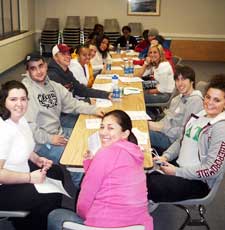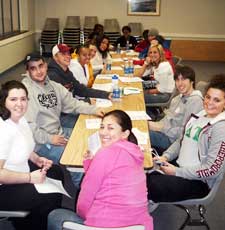 KINGSTON, R.I. — April 27, 2006 — Megan Marshall educates residents of El Salvador who intend to migrate, JoAnna Williams helps coordinate Rhode Island public health initiatives, and Kristen Olson promotes Maryland college athletic teams.
KINGSTON, R.I. — April 27, 2006 — Megan Marshall educates residents of El Salvador who intend to migrate, JoAnna Williams helps coordinate Rhode Island public health initiatives, and Kristen Olson promotes Maryland college athletic teams.
The three University of Rhode Island graduates followed divergent career paths, but have one thing in common: each graduated with a minor in leadership studies and credit that experience with their success.
The minor, sponsored by the URI Center for Student Leadership Development, is an interdisciplinary program, linking practical application with theoretical leadership skills. When it was offered in 1998, it was one of the first such minors in the country. “Leadership courses are a big growth area today,” said Christine Wilson, assistant director for student leadership.
The minor gives students a lens to see where they can apply their leadership skills, according to Wilson. There are 120 students enrolled in the minor, another 400 students who take at least one leadership class, and about 1,000 other students who participate in other center activities. There are 111 alumni who graduated with the minor.
The minor offers five tracks: emerging leadership, outreach and peer leadership, fraternity/sorority leadership, leadership in activism/social change units, and leadership in student athletics.
Marshall graduated in 2003 with a major in psychology and minors in both leadership and hunger studies. “Those classes are what gave me the skills and thought structures that I use now to help people,” said the Tolland, Conn. native. “Where else can you learn about the real stuff of the world, and make everyday in class mean something later in life?” she asks.
Now a volunteer with Catholic Relief Services in El Salvador, she works closely with Salvadorian immigrant workers, teaching them about their rights and tracking human rights abuses. She also teaches those looking to immigrate about the transit process and helps to establish a network of contacts on the U.S. border. According to Marshall, about 700 people leave El Salvador everyday to come to the U.S.
“It is the missing link that should be added to all bachelor’s degrees,” says JoAnna Williams who graduated with a degree in human science and services in 2002.
The Cranston resident now works at the Rhode Island Department of Health as a promotion specialist for the Healthy Rhode Island 2010 initiative where she assists in coordinating and monitoring the program. Williams will graduate in May from Boston University with a master’s degree in public health and hopes to add a consulting business for resume writing and skills identification to her already busy schedule.
Kristen Olson, a 2004 graduate, followed the student-athlete leadership track. “Those classes helped me gain confidence speaking in front of groups and helped me communicate better with my softball team, “ she said. “It also helped me open my eyes to the rest of campus because, as an athlete, I spent most of my time going from class to the athletic facilities and sometimes forgot that there were other opportunities for campus involvement.”
Her leadership experience helped her land a job as the assistant director of marketing and promotions at the University of Maryland, Baltimore County. “During the interview, my current supervisor asked me more questions about my leadership minor than he did about anything else,” she said.
Olson’s responsibilities include marketing the school’s 20 sports teams to the campus community, student organizations, and surrounding businesses. She hopes to eventually become a Division I athletic director, and is taking classes at Maryland’s College Park campus toward a master’s degree in higher education administration.
“The leadership studies minor is hands down valuable,” she said. “It absolutely helped me to realize my potential.”
Leaders of Tomorrow: URI Leadership minor students attend a leadership seminar. Photo Courtesy of The Leadership Program.

